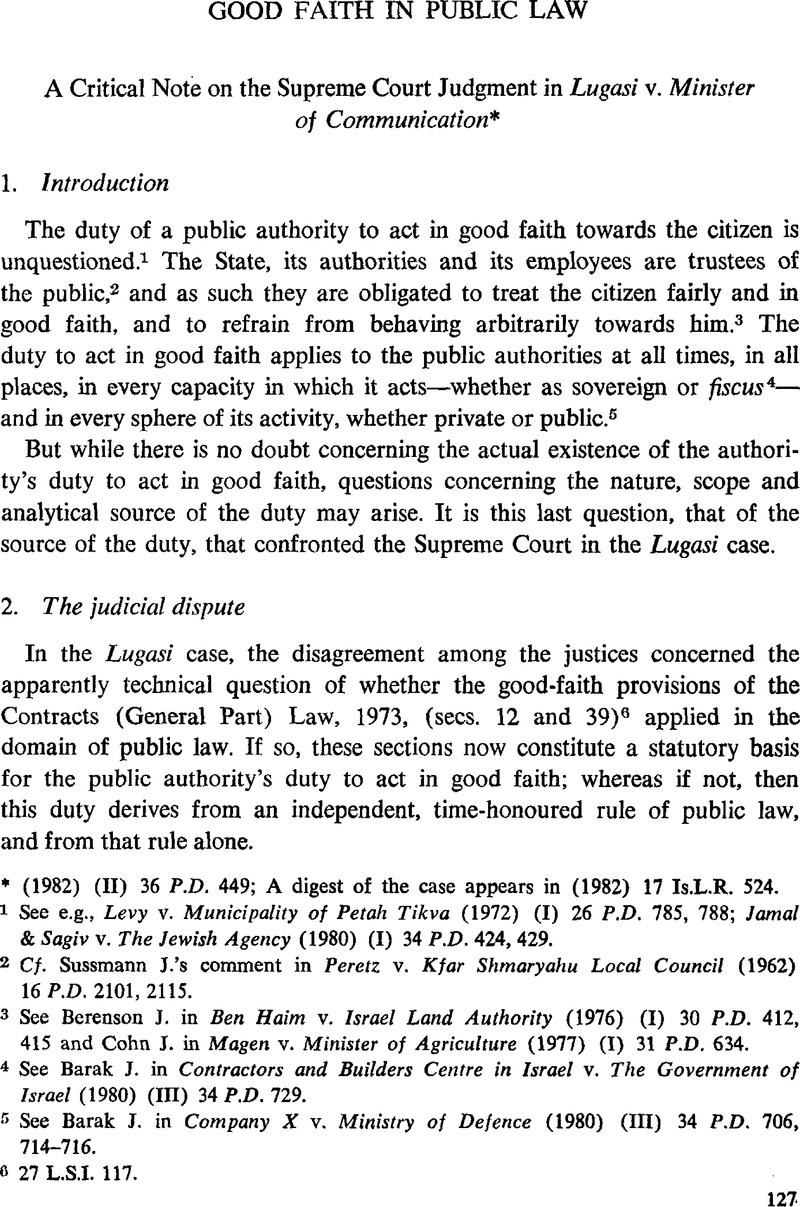No CrossRef data available.
Published online by Cambridge University Press: 16 February 2016

1 See e.g., Levy v. Municipality of Petah Tikva (1972) (I) 26 P.D. 785, 788; Jamal & Sagiv v. The Jewish Agency (1980) (I) 34 P.D. 424, 429.
2 Cf. Sussmann J.'s comment in Peretz v. Kfar Shmaryahu Local Council (1962) 16 P.D. 2101, 2115.
3 See Berenson J. in Ben Haim v. Israel Land Authority (1976) (I) 30 P.D. 412, 415 and Cohn J. in Magen v. Minister of Agriculture (1977) (I) 31 P.D. 634.
4 See Barak J. in Contractors and Builders Centre in Israel v. The Government of Israel (1980) (III) 34 P.D. 729.
5 See Barak J. in Company X v. Ministry of Defence (1980) (III) 34 P.D. 706, 714–716.
6 27 L.S.I. 117.
7 An “opposite” question to the one that arose in the Lugasi case came up in the judgment in Raviv v. Beit Yules, (not yet published but see digest of case in (1982) 17 Is.L.R. 528). While Lugasi discussed the question of importing provisions from private law into the body of public law, the latter case was concerned with importing legal rules from public law (laws of public tenter) into private law.
8 See e.g., Ben Haim v. Israel Land Authority (1976) (I) 30 P.D. 412, 413 and Scitex v. Minister for Trade and Industry (1976) (I) 30 P.D. 673, 676.
9 Lugasi, Ibid. at 455.
10 Ibid., at 465.
11 Ibid., at 465.
12 Ibid., at 452.
13 (1976) 2 Tel Aviv University Studies in Law 7.
14 Ibid., at 27–28.
15 Ibid., at 31.
16 See Azarnikov v. State of Israel (1980) (I) 34 P.D. 270 and Bernovsky v. Director of Customs (1978) (II) 32 P.D. 75, two judgments in which sec. 39 of the Contracts Law was applied to obligations arising out of public law. Nevertheless two fine distinctions between these decisions should be noted. The first decision applies the first part of sec. 39 concerning the fulfiling of an obligation deriving from a contract to the State as obligor, by explicit reference to sec. 61 (b) of the Contracts Law. However, the second one applies the latter part of sec. 39 concerning the use of a right deriving from a contract, where the state is the obligee, and this without reference to sec. 61 (b).
17 See Ben Haim v. Israel Land Authority (1976) (I) 30 P.D. 412, 415; Company X v. Ministry of Defence (1980) (III) 34 P.D. 706, 716; Batei Ilanot v. Arad Local Council (1981) (II) 35 P.D. 309, 312; Mayor Co. v. Netivei Ayalon Company (1981) (III) 35 P.D. 596, 601.
18 Cf. Sharviv v. Mayor of Nahariya (1980) (I) 34 P.D. 467, 472; Migeda v. Minister of Health (1981) (II) 35 P.D. 673, 679.
19 There is one, uniform law that applies to the activities of a public authority. See Barak J. in Company X v. Ministry of Defence, op. cit., supra n. 5 at 706. 715.
20 As Elon J. stated in Lugasi v. Minister of Communication, op. cit., supra at 449, 468, 470 and cf. Shamgar J. in Kedar v. State of Israel (1980) (IV) 34 P.D. 468, 474: “The administration is obliged to conduct itself according to different criteria than the individual, and this is so also where the administration acts in areas that are wholly commercial in nature.” But as opposed to this see Elon, J. in Lugasi, at p. 470Google Scholar: “sometimes a higher standard of honesty and fairness is demanded of the individual in his interpersonel relations, than is demanded of the public administration.”
21 See Shamgar, J., in Lugasi, at pp. 459 ffGoogle Scholar.
22 See Public Transport Services of Beersheba Ltd. v. National Labour Court (1981) (I) 35 P.D. 828, 835; and see also Shohat v. Lubianker (1982) (II) 36 P.D. 113 at 120.
23 Sec. 12 expressly provides for damages for a breach of the duty to act in good faith in negotiations, whereas sec. 39 is interpreted as laying down a contractual obligation whose breach enables the award of the usual contractual remedies. See Public Transport Services of Beersheba Ltd. v. National Labour Court, op. cit., supra n. 22.
24 12 L.S.I. 138.
25 Company X v. Ministry of Defence, op. cit., supra n. 5 at 716. Dwek v. Bechar (1981) (II) 35 P.D. 197.
26 See the article by Sussmann J. cited above, supra n. 13.
27 Cf. Sussmann, op. cit., supra n. 13 at p. 20: “Chauvinism is not to replace common sense”.
28 See e.g., the judgment in Bernovsky v. Director of the Customs, op. cit., supra n. 16 in which Sussmann J. applied the obligations determined for the citizen-citizen relationship to the authority-citizen relationship.
29 Shilo v. Retzkovski (1981) (III) 35 P.D. 449, 461.
30 High Court 566/80 not yet published.
31 Public Transport Services of Beersheba Ltd. v. National Labour Court, op. cit., supra n. 22.
32 And this is the opinion of Zeltner in his book Contract Law of the State of Israel (Avuka, Tel Aviv, 1976, in Hebrew) at p. 20Google Scholar, and in contrast see the more restrictive view of Tedeschi in “Contracts (General Part) Bill, 1970” (1971) 3 Mishpatim 105, 108Google Scholar.